
Galba was Roman emperor, ruling for 7 months from 8 June AD 68 to 15 January 69. He was the first emperor in the Year of the Four Emperors and assumed the throne following Emperor Nero's suicide.
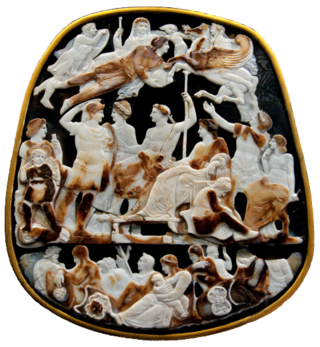
The Julio-Claudian dynasty comprised the first five Roman emperors: Augustus, Tiberius, Caligula, Claudius, and Nero.

Otho was Roman emperor, ruling for three months from 15 January to 16 April 69. He was the second emperor of the Year of the Four Emperors.

Aulus Vitellius was Roman emperor for eight months, from 19 April to 20 December AD 69. Vitellius became emperor following the quick succession of the previous emperors Galba and Otho, in a year of civil war known as the Year of the Four Emperors. Vitellius added the honorific Germanicus to his name instead of Caesar upon his accession. Like his predecessor, Otho, Vitellius attempted to rally public support to his cause by honoring and imitating Nero who remained popular in the empire.
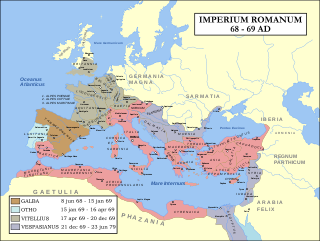
AD 69 (LXIX) was a common year starting on Sunday of the Julian calendar. In the Roman Empire, it was known as the Year of the consulship of Galba and Vinius. The denomination AD 69 for this year has been used since the early medieval period, when the Anno Domini calendar era became the prevalent method in Europe for naming years.
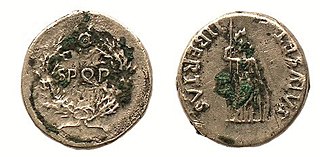
Gaius Julius Vindex, was a Roman governor in the province of Gallia Lugdunensis. He was of a noble Gallic family of Aquitania and was one of the men belonging to a faction of Empress Agrippina, the mother of Nero. Vindex had taken part in a conspiracy against the emperor in 59.
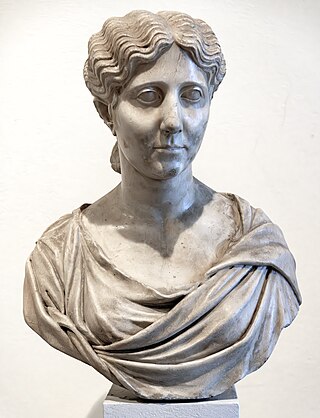
Antonia Minor was the younger of two surviving daughters of Mark Antony and Octavia Minor. She was a niece of the Emperor Augustus, sister-in-law of the Emperor Tiberius, paternal grandmother of the Emperor Caligula and Empress Agrippina the Younger, mother of the Emperor Claudius, and maternal great-grandmother of the Emperor Nero. She outlived her husband Drusus, her oldest son, her daughter, and several of her grandchildren.

The gens Livia was an illustrious plebeian family at ancient Rome. The first of the Livii to obtain the consulship was Marcus Livius Denter in 302 BC, and from his time the Livii supplied the Republic with eight consuls, two censors, a dictator, and a master of the horse. Members of the gens were honoured with three triumphs. In the reign of Augustus, Livia Drusilla was Roman empress, and her son was the emperor Tiberius.

The Year of the Four Emperors, AD 69, was the first civil war of the Roman Empire, during which four emperors ruled in succession: Galba, Otho, Vitellius, and Vespasian. It is considered an important interval, marking the transition from the Julio-Claudians, the first imperial dynasty, to the Flavian dynasty. The period witnessed several rebellions and claimants, with shifting allegiances and widespread turmoil in Rome and the provinces.

The gens Julia was one of the most prominent patrician families in ancient Rome. Members of the gens attained the highest dignities of the state in the earliest times of the Republic. The first of the family to obtain the consulship was Gaius Julius Iulus in 489 BC. The gens is perhaps best known, however, for Gaius Julius Caesar, the dictator and grand uncle of the emperor Augustus, through whom the name was passed to the so-called Julio-Claudian dynasty of the first century AD. The nomen Julius became very common in imperial times, as the descendants of persons enrolled as citizens under the early emperors began to make their mark in history.
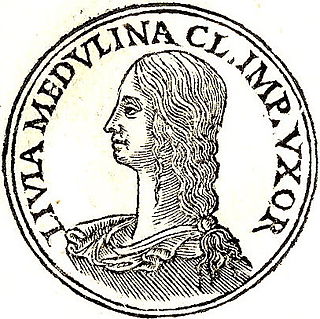
FuriaLivia Medullina Camilla was the second fiancee of the future Emperor Claudius.

De vita Caesarum, commonly known as The Twelve Caesars or The Lives of the Twelve Caesars, is a set of twelve biographies of Julius Caesar and the first 11 emperors of the Roman Empire written by Gaius Suetonius Tranquillus. The subjects consist of: Julius Caesar, Augustus, Tiberius, Caligula, Claudius, Nero, Galba, Otho, Vitellius, Vespasian, Titus, Domitian.
Lucius Calpurnius Piso Frugi Licinianus (38–69) was a Roman nobleman who lived in the 1st century. His adoption by the Roman emperor Galba on 10 January 69 AD precipitated their joint murder by Otho, who had expected to be adopted instead. Otho then became the second emperor of the Year of the Four Emperors.
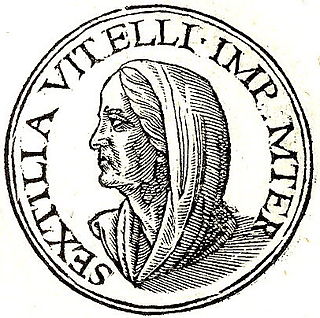
Sextilia was the mother of Lucius Vitellius the Younger and Aulus Vitellius.
Lucius Salvius Otho Titianus was the elder brother of the Roman Emperor Otho. As a Roman senator, he was consul in the year 52 as the colleague of Faustus Cornelius Sulla Felix, and appointed consul as his brother's colleague for the period from Galba's murder to the end of February. When Otho left Rome to halt the advance of Vitellius into Italy, he put the daily imperial responsibilities in the hands of Titianus. Subsequently, Titianus was appointed generalissimo in charge of the war by Otho and was present at the First Battle of Bedriacum.

Tiberius Claudius Drusus was the eldest son of the Roman Emperor Claudius with his first wife Plautia Urgulanilla. He had one younger sister, Claudia, who was repudiated by Claudius along with Plautia.

The gens Salvia was a minor plebeian Roman family of the late Republic, which came to prominence under the early Empire. The first of the family known to have held public office at Rome was Publius Salvius Aper, praetorian prefect in 2 BC. About this time, the Salvii achieved equestrian rank, and thereafter held various positions in the Roman state for the next two centuries, before falling back into obscurity. Lucius Salvius Otho was raised to patrician rank by the emperor Claudius, but the most illustrious of the Salvii was his son, Marcus, who was proclaimed emperor in AD 69.
Aulus Marius Celsus was a Roman senator who held several offices in the emperor's service during the first century AD, as well as playing a role in the Year of Four Emperors. He was suffect consul of the nundinium of July to August 69 as the colleague of Gnaeus Arrius Antoninus.
Marcus Salvius Otho was an ancient Roman politician and grandfather of emperor Otho.















